|
|
|
Sort Order |
|
|
|
Items / Page
|
|
|
|
|
|
|
| Srl | Item |
| 1 |
ID:
121578
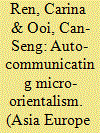

|
|
|
|
|
| Publication |
2013.
|
| Summary/Abstract |
Using the concepts of auto-communication and micro-Orientalism, this article argues that nation branding at World Expos produces and propagates notions of difference and Otherness. We examine how Denmark presents itself in China, and how the message inevitably tells how the Danish authorities view the Chinese. Using the Danish 'Welfairytales' pavilion at the 2010 World Expo in Shanghai, we show how the national self is performed in two versions. One attempts to communicate 'the good Danish life' to the Danes themselves, while the other claims Occidental superiority. The case shows how the Danish exhibition is performed and regulated as sustainable and authentic and how in spite of its seemingly dialogical and interactive layout, a number of auto-communicative and micro-Orientalist practices are enacted. This study is based on field participation, observations and interviews. Public sources of information are also used.
|
|
|
|
|
|
|
|
|
|
|
|
|
|
|
|
| 2 |
ID:
121580


|
|
|
|
|
| Publication |
2013.
|
| Summary/Abstract |
In the wake of the financial crises of the last two decades, the promotion of corporate governance reform has emerged as a priority concern of the international financial community. This paper draws attention to the role played by Sovereign Wealth Funds (SWFs) in this process. It shows that SWFs' enactment of a common set of shareholder-oriented corporate governance reforms has not solely been driven from the 'outside in'-i.e. conforming to prevailing global financial norms and pressures. Indeed, various SWFs are in fact attempting to change financial best practice from the 'inside out' by promoting a transformative shareholder-value model of corporate governance throughout the companies they hold in their investment portfolios. To better elucidate the dynamics of this process, this paper looks at the experience of two SWFs in Asia and Europe. More specifically, it will explore the corporate governance agendas of Norway's Government Pension Fund-Global and Malaysia's Khazanah Nasional Berhad.
|
|
|
|
|
|
|
|
|
|
|
|
|
|
|
|
| 3 |
ID:
121577
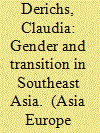

|
|
|
|
|
| Publication |
2013.
|
| Summary/Abstract |
Theories and concepts of political transition have been influenced to a great deal by Western theoretical and conceptual reflection. The parameters of transition are usually based on two assumptions or expectations: The goal of transition is democracy or a democratic system, and both actors and affected persons are perceived as gender-neutral beings, i.e., there is no distinction made between male or female actors and persons concerned. This article problematizes the conventional concept of transition and attempts a gendered conceptualization. Empirically, it draws from studies and fieldwork during the periods of political transition in Indonesia (mostly accomplished) and Malaysia (ongoing). It addresses the impacts of transition on women in particular. The core argument is that conceptual reflections of transition need to integrate a gender-sensitive perspective, but at the same time attend to the fact that "women" is not an exhausting analytical category. As illustrated by the examples of Indonesia and Malaysia, a gender-sensitive approach thus requires to also take the pluralism and heterogeneity of "women" (as well as "men") into account.
|
|
|
|
|
|
|
|
|
|
|
|
|
|
|
|
| 4 |
ID:
121581
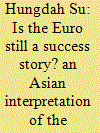

|
|
|
|
|
| Publication |
2013.
|
| Summary/Abstract |
Since outbreak of the sovereign debt crisis in several member states of the Eurozone in 2010, the Euro as a success story was suddenly thrown into doubt. In Asia, more and more scholars and policy analysts, a majority of whom had not focused their study on the EU or Euro before the crisis, have criticized the monetary integration in the Eurozone, put into doubt the value of European integration as a whole, and reiterate their pessimistic theses about the future of the European economy. This article represents a rebuttal to this criticism, arguing that the common currency is truly in difficulty but not in an impasse. A return to a success story of the Euro is still probable, if European leaders and their citizens could reestablish a balancing model between the financial discipline and economic growth in the EU, to which a general and in-depth debate over the future of European integration is indispensable.
|
|
|
|
|
|
|
|
|
|
|
|
|
|
|
|
| 5 |
ID:
121582
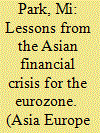

|
|
|
|
|
| Publication |
2013.
|
| Summary/Abstract |
This paper comparatively examines diverse responses from three major actors in the global political economy (the state, civil society, international financial institutions) to the Asian financial crisis of 1997 and the current eurozone crisis. First, it analyses conditional lending policies of international financial institutions (IFIs) such as the International Monetary Fund toward countries in fiscal distress. It then critically examines how the lending policies engendered social tensions and conflicts as austerity measures such as cuts to social welfare programmes hit hard on the populace. Examining how the state and civil society in Asia reacted to and, as a result of contentious state-civil society interactions, altered the policies of IFIs, the paper draws lessons from the Asian financial crisis for the European Union and puts forwards alternative policy suggestions.
|
|
|
|
|
|
|
|
|
|
|
|
|
|
|
|
| 6 |
ID:
121579
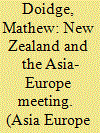

|
|
|
|
|
| Publication |
2013.
|
| Summary/Abstract |
This article considers New Zealand's accession to the Asia-Europe Meeting, considering both its formal path to membership and the evolving calculus by which its views of the process were structured, focusing on elements such as the enabling context provided by a change of national government in 2008, the impact of the global financial crisis and the position of Australia. Drawing on a set of interviews undertaken within the New Zealand Ministry of Foreign Affairs and Trade, it goes on to examine perceived benefits of the Asia-Europe Meeting for New Zealand, and the extent to which these have been achieved. Finally, it addresses the issue of a New Zealand ASEM strategy, outlining potential areas for future engagement.
|
|
|
|
|
|
|
|
|
|
|
|
|
|
|
|
| 7 |
ID:
121576
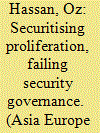

|
|
|
|
|
| Publication |
2013.
|
| Summary/Abstract |
In 2003, the European Union declared the threat of weapons of mass destruction 'potentially the greatest threat to our security' and increasingly called for the issue of nuclear proliferation to be managed within its preferred multilateral security governance frameworks. In spite of this, and the increased securitisation of proliferation, the EU has fundamentally continued its historical record of failing to engage with India and Pakistan's nuclear rivalry, and has not been able to move significantly beyond a relationship with South Asia based on trade and aid. This is deeply problematic given the regional instability posed by the Indo-Pakistani enduring rivalry, and the fact that Pakistan is not only an unstable nuclear weapons state, but has been known to harbour international terrorists and nuclear proliferators. Given these conditions, as the EU acknowledges, the stakes of failing to engage could not be higher. A deeper analysis of EU engagement, however, demonstrates that EU security governance is limited, ineffectual, inconsistent and largely perceived as neo-colonial in what is the world's most likely nuclear flashpoint. If the EU is to be considered a global actor in security governance, a key objective of the Treaty of Lisbon, then this needs to be redressed.
|
|
|
|
|
|
|
|
|
|
|
|
|
|
|
|
|
|
|
|
|